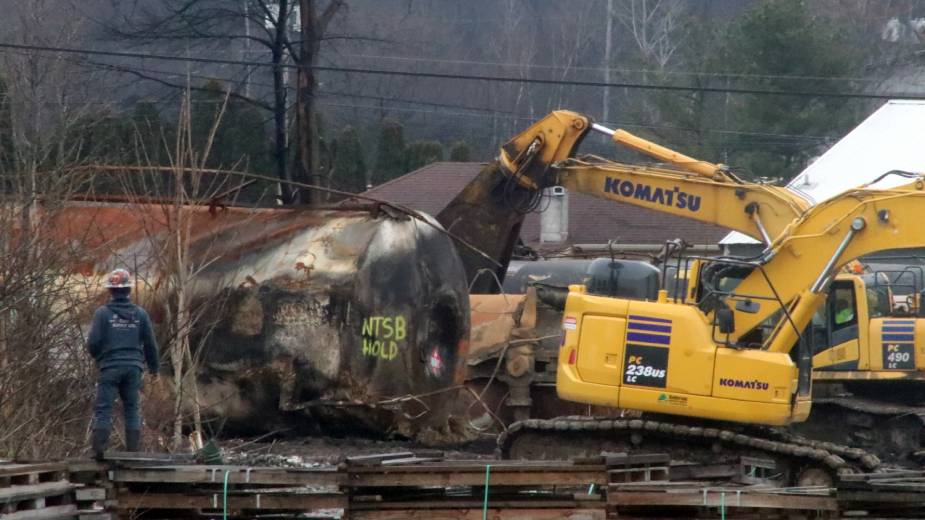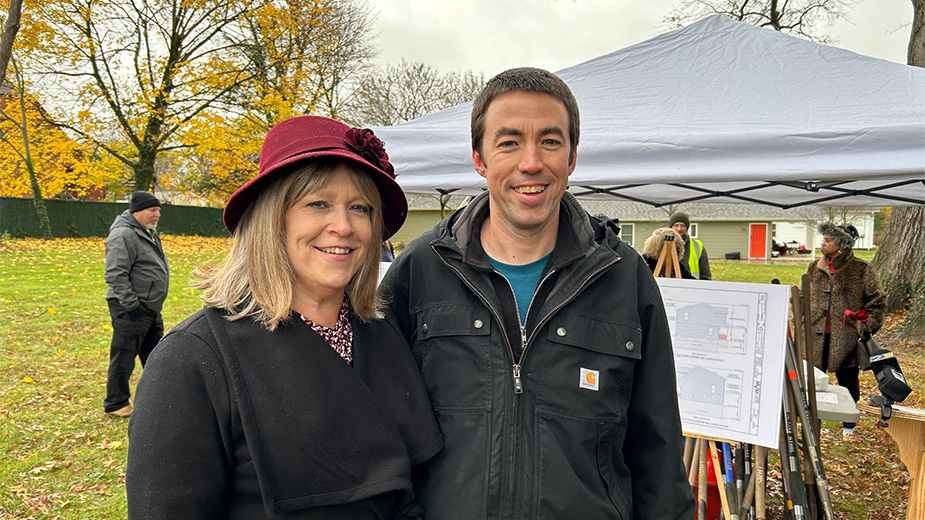Derailment Leads to Bipartisan Push for Railway Safety
EAST PALESTINE, Ohio – The East Palestine train derailment has led to the bi-partisan introduction of railway safety legislation in the U.S. Senate.
Aiming to prevent future train disasters, The Railway Safety Act of 2023, will take aim at safety measures regarding hazardous materials, as well as train and crew requirements.
The four U.S. Senators closest to the derailment, which happened on the Ohio-Pennsylvania border –J.D. Vance (R-OH), Sherrod Brown (D-OH), Bob Casey (D-PA) and John Fetterman (D-PA) – are joined by Marco Rubio (R-FL) and Josh Hawley (R-MO) to introduce the bill.
The bill will include new safety requirements and procedures for trains carrying hazardous materials like vinyl chloride, the chemical that created the risk for explosion and led to the vent and burn of five of the derailed train cars in East Palestine.
The preliminary report of the National Safety Transportation Board investigators showed the train passed three hotbox detectors in the 30 miles before the derailment. The final two were spaced just under 20 miles apart and indicated an increase in temperature of the wheel bearings of one of the railcars from 103-degrees above ambient to 253-degrees above ambient between that distance. The train derailed right after the alarm sounded for the 253-degree reading as the engineer was slowing the train.
The legislation being introduced would require trains carrying hazardous materials to be scanned by hotbox detectors every 10 miles.
Although the Norfolk Southern train actually had three employees onboard – one being a trainee – the new legislation would required two well-trained crewmembers aboard every train amid concerns that the railroads are pushing to reduce that number to one.
Additionally, the legislation being introduced would require advanced notification and information for state emergency response officials about what is being transported; substantially increase the maximum fines the U.S. Department of Transportation can impose for safety violations and strengthen the inspection requirements for hazardous material trains.
The legislation does not come without funding. It would expand HAZMAT training grants for local law enforcement and first responders by increasing registration fees paid by large Class I railroads, provide $22 million to the Federal Railroad Administration (FRA) for research and development grants regarding wayside defect detectors and other rail priorities and provide $5 million to the Pipeline and Hazardous Materials Safety Administration (PHMSA) for expenses related to developing stronger tank car safety features.
Both the FRA and PHMSA have been in East Palestine during the NTSB investigation and clean up efforts following the Feb. 3 derailment.
In press releases announcing the legislation, both Brown and Vance, as well as senators Casey, Rubio and Hawley made remarks about putting partisanship aside, holding the railways accountable and protecting other communities from what happened to East Palestine.
However, yesterday, yet another train derailment of seven railcars occurred, this time in Manatee County, Florida, near the Sarasota Bradenton International Airport. Reports from that area state there were 30,000 gallons of propane inside one of the Seminole Gulf Railway railcars that tipped over. As of Wednesday, it was being monitored for leaks while clean up could take several days.
There is no timetable for the clean up of the East Palestine derailment according to Debra Shore, the U.S. EPA administrator for Region Five. Norfolk Southern is expected to submit a plan for the clean up, which is being overseen by the Federal EPA.
Shore has said while those cleaning up the site are trying to get those materials out of East Palestine quickly, there is no place capable of processing all of it, so materials are being sent to several locations.
While in town on Wednesday, Ohio Gov. Mike DeWine said before this ends he has been told 30,000 truckloads of contaminated materials will be hauled from the site of the derailment in East Palestine. Materials are being sent for disposal at licensed locations – Heritage Thermal Services, East Liverpool; Vickery Environmental, Inc. in Vickery, Ohio; Ross Incinerator in Grafton, Ohio; and Heritage Environmental Services Hazardous Landfill in Roachdale, Ind.; while locations in Michigan and Texas reportedly have stopped accepting materials from the derailment site.
In addition to overseeing clean up efforts, the Federal EPA opened an EPA Community Welcome Center on Wednesday with Administrator Michael Regan in attendance. Following the opening, the center at 25 N. Market St. had many residents inside, talking one on one with EPA officials.
Francisco Arcaute, one of the community involvement coordinators, said the pamphlet being given to residents is the first step to providing information regarding their concerns including water sampling and clean up efforts.
“We understand that residents are concerned,” Arcaute said, “So EPA and a host of other federal agencies including FEMA and the CDC and many other local, state and county agencies are trying to answer these questions.”
The center will be open from 8 a.m. to 8 p.m. daily.
In addition, the EPA has met with or placed fliers providing information in more that 700 doors. The EPA has an information hotline set up for area residents at 866-361-0526, which can provide information and schedule cleaning services for homes and businesses in the community.
A public open house is scheduled for 6 p.m., Thursday at the East Palestine High School.
The addition of the Trace Atmospheric Gas Analyzer (TAGA) bus, is expected to expand air quality monitoring and provide quicker results. The TAGA bus will allow the EPA to begin to drive through the community while sampling and processing air quality during the remediation phase and quickly react to any air quality issues that would arise.
Air monitoring data is being posted online and Shore said they have found no instances of volatile organic chemicals higher than safe standards. Primarily after the vent and burn, they tested for primary chemicals expected in the air. She considers dioxin a secondary byproduct and since the primary biproducts were not found, they would not expect to find dioxins.
However, in response to the community’s concerns, they are considering adding checks for dioxins to the clean up work plan.
Another bipartisan piece of legislation introduced in the U.S. House on Wednesday by local Rep. Bill Johnson (OH-6) would ensure that East Palestine residents and businesses receiving disaster relief payments following the derailment will be exempt from paying taxes on that compensation. The legislation is being co-sponsored by 10 other congress members across the state.
Copyright 2024 The Business Journal, Youngstown, Ohio.



